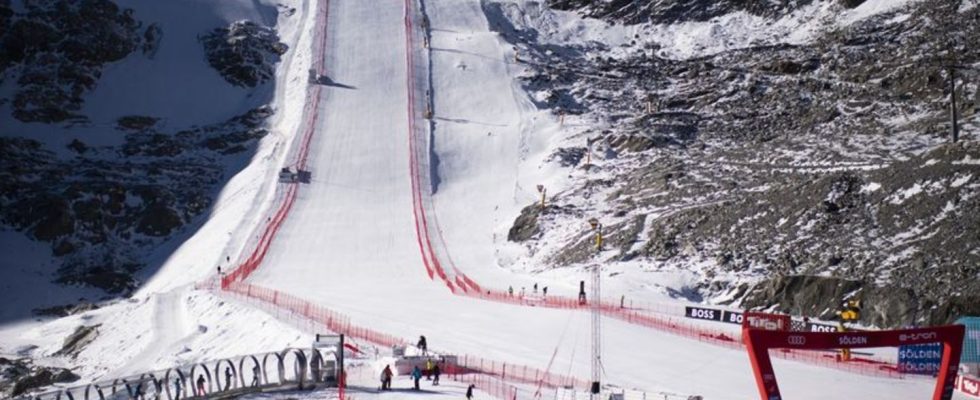Winter sports
Alpine start in Sölden: environmental debate instead of skiing anticipation
Even before the start of this year’s World Cup, climate and environmental issues are more in focus than sport. photo
© Gian Ehrenzeller/Keystone/dpa
Last time you thought it was late summer in Central Europe, the ski season is now beginning in Sölden. And again there is heated debate about the event. This time Greenpeace caused an outcry.
The Alpine Ski World Cup actually wants to celebrate the season’s overture this weekend with its annual glacier party in the Ötztal. Before the traditional start of the competition in But Sölden’s focus – once again – is not on sport on two boards.
Instead, accusations from conservationists and a sometimes very emotional mix of approval and rejection are shaking up the scene. Environmental protection and climate sensitivity are opposed to tourism and the million-dollar business of winter sports. It’s complicated.
The industry has been discussing the event at the end of October high up on the Rettenbach Glacier for years and whether this is still appropriate in times of climate change. A communication from Greenpeace Austria in September caused particular excitement this time. The environmentalists wrote that since April, excavators have been destroying parts of the glacier to make way for the World Cup course. Even explosions were “probably” carried out, the explosive report said.
Organizers fight back
Many observers were outraged. Former racing driver Felix Neureuther spoke of a “catastrophe for the credibility of the sport” in a BR podcast and called the images “very disturbing and simply no longer up to date.” Austria’s top athlete Manuel Feller admitted that the photos looked “naturally catastrophic”.
The organizers defend themselves against the claim that they are removing the glacier for a sporting event – instead Greenpeace is accused of populism. Wolfgang Maier, the sports director of the German Ski Association (DSV), had the work explained to him on site in the summer. “It’s not like nature was destroyed here and the glacier was blown up,” he reported.
Rather, it was about crushing larger boulders that had come to light because the glacier had continued to recede – keyword climate change. The smaller the stones, the less snow would be needed to prepare a ski slope, the Söldeners explain. “You are actually already on the way to addressing the issue in a more ecological way,” said Maier.
The German downhill skier Thomas Dreßen, who is sponsored by the Sölden mountain railways, also called the Ötztal after the Greenpeace allegations became known and was reassured that they were only carrying out maintenance measures in order to have to produce less artificial snow. “So it’s actually sustainable and better for the climate in the long term if you want to do skiing,” said Dreßen.
Activists and officials in the Ski World Cup agree that skiing is suffering greatly from the headlines. And once again many people are wondering why the race has to take place in October.
Criticism of the early start to the season
The main reason is economic: the women’s giant slalom on Saturday and men’s on Sunday (10 a.m./1 p.m./ZDF/Eurosport) are intended to boost ski tourism for the coming winter at an early stage. The calculation: Anyone who sees great sport against a breathtaking backdrop on television is reminded that the cold season is approaching – and then books a ski holiday straight away and, ideally, also buys new equipment.
In recent years, the ski circus in Sölden has often had to do without a white winter landscape. More and more athletes agree that you could save yourself a lot of criticism if you postpone the start of the season by two or three weeks. “To what extent should we adapt our environment to a schedule that we want? Or should we adapt our schedules to the environment?” recently asked Mikaela Shiffrin, the exceptional American athlete and favorite in the new season.
Former ski superstar Marcel Hirscher also said in an interview with the APA news agency that the season was starting too early – and as an Austrian he knows only too well that skiing in the Alpine republic is at least as sacred as the Oktoberfest in Munich or the carnival in the Rhineland.
So in the future it won’t start until November? Then it will be difficult to accommodate all the planned races by March – the world association Fis under the controversial president Johan Eliasch expanded the calendar this year to 45 races per gender. Or just drive longer in the spring, until April? “But then who cares?” even asked the German women’s head coach Andreas Puelacher. It remains complicated.

